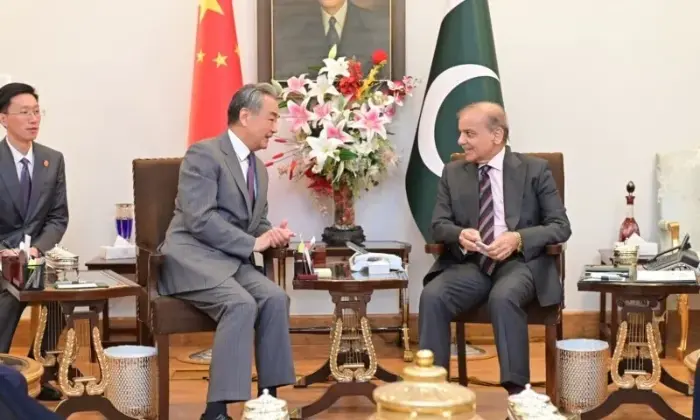China Reaffirms Strong Partnership with Pakistan, Vows Support for Regional Peace and Development

Islamabad, August 21, 2025 – China has once again underscored its commitment to strengthening ties with Pakistan, pledging to work closely on advancing peace, stability, and development across the region.
Chinese Foreign Minister Wang Yi, who is currently visiting Islamabad, held high-level meetings with Prime Minister Shehbaz Sharif, President Asif Ali Zardari, Deputy Prime Minister and Foreign Minister Ishaq Dar, and other senior officials. His visit comes at a critical time, as both nations prepare to celebrate the 75th anniversary of their diplomatic relations in 2026.
Wang Yi Meets PM Shehbaz Sharif
During his meeting with Prime Minister Shehbaz, Wang Yi hailed Pakistan as China’s “all-weather strategic partner and iron brother.” He praised Islamabad’s resilience in defending its sovereignty and reiterated Beijing’s resolve to deepen cooperation in trade, energy, agriculture, defense, and infrastructure.
PM Shehbaz expressed gratitude to China for its unwavering support, stressing that Pakistan is committed to further strengthening the China-Pakistan Economic Corridor (CPEC), which he described as a lifeline for the country’s socio-economic development and regional connectivity.
The prime minister also announced his upcoming visit to Tianjin and Beijing later this month to attend the Shanghai Cooperation Organisation (SCO) Summit, where he will meet President Xi Jinping, Premier Li Qiang, and other top Chinese leaders.
President Zardari Highlights “Iron Brotherhood”
At the Presidential Palace, Wang Yi also met President Asif Ali Zardari in the presence of senior political leaders including Bilawal Bhutto-Zardari. The president described China as Pakistan’s “time-tested and most reliable friend,” affirming that friendship with Beijing remains the cornerstone of Islamabad’s foreign policy.
Zardari acknowledged China’s consistent support on Pakistan’s sovereignty, economic stability, and its principled stance on the Kashmir issue. He also highlighted CPEC’s strategic importance, saying it will enhance regional economic integration, connectivity, and peace.
Strengthening CPEC-II
In discussions with FM Ishaq Dar, both sides reaffirmed their commitment to CPEC Phase-II, focusing on industrialization, mining, agriculture, ICT, and renewable energy. Wang Yi announced that CPEC would now be upgraded into “a growth corridor, livelihood corridor, green corridor, and open corridor.”
He further emphasized China’s support for key projects such as Gwadar Port, the Karakoram Highway realignment, and the ML-1 railway upgrade, while also welcoming third-party participation.
Security & Counterterrorism Cooperation
Wang Yi praised Pakistan’s ongoing counterterrorism operations, noting that Islamabad is effectively safeguarding Chinese nationals and institutions in the country. He assured that Beijing will continue to stand by Pakistan in the fight against terrorism and in promoting peace in Afghanistan and beyond.
Earlier this week, the sixth trilateral meeting between the foreign ministers of Pakistan, China, and Afghanistan in Kabul highlighted cooperation in counterterrorism, regional trade, transit, health, and education, along with plans to extend CPEC into Afghanistan.
Humanitarian and Future Cooperation
Wang Yi conveyed condolences over the recent floods in Pakistan and announced that China will provide emergency humanitarian assistance. He also confirmed Beijing’s readiness to host Prime Minister Shehbaz at the SCO Summit in Tianjin and to launch a series of activities marking 75 years of Pak-China friendship in 2026.
A Partnership for the Future
Both countries reaffirmed their “All-Weather Strategic Cooperative Partnership”, with leaders agreeing that Pak-China ties are crucial for regional peace, stability, and prosperity. The upcoming Pakistan-China Business-to-Business Investment Conference is expected to attract major investment opportunities under CPEC-II.
As Pakistan and China step into a new era of cooperation, both sides reiterated that their relationship remains unshakable, future-focused, and vital for the stability of South Asia and beyond.